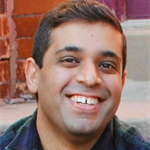Speaker Series: Rahim Kurwa

This talk argues for a re-consideration of policing as a key factor in the historic and contemporary production of racial residential segregation. Historical evidence suggests that policing has long been a substituting force among many modes of segregation which increased and decreased in use and effectiveness based on social and legal context. However, in contemporary contexts, policing not only substitutes for other mechanisms of segregation, but also has become synthesized with them. Using a case study of crime-free and nuisance housing ordinances, I suggest that policing has been metabolized into the everyday ways that residents reproduce hierarchy within neighborhoods. These ordinances encourage individuals to surveil their neighbors and file complaints with them through city bureaucracies and municipal police departments. These processes threaten and, in many cases, produce eviction, which reproduces segregation in the context of whites policing Black neighbors.
Building from Cheryl Harris’ work on whiteness as property, I theorize policing as a form of property. I argue that to engage in neighborhood policing is to acquire social status and power through dispossession, forms of social status unavailable to those vulnerable to such policing. As traditional mechanisms of racial segregation weaken or change, seeing how policing functions as property reveals one way that whiteness is imbued with new meaning in the face of de-segregation.
To access the related paper draft, please click here.
To register, contact Sophie Kofman at skofman@abfn.org.
_____________________________________________________________________________________
Rahim Kurwa is an ABF Visiting Scholar (September 2022- August 2023) and an Assistant Professor in the Department of Criminology, Law and Justice and Department of Socioogy (by courtesy) at the University of Illinois at Chicago. His research is at the intersection of race, policing, and residential segregation. His book project, Apartheid’s Afterlives: Policing Black Life in the Antelope Valley, documents how Los Angeles’ northernmost suburb used the criminalization and policing of the Section 8 Housing Choice Voucher program to evict Black residents and re-segregate the region. Professor Kurwa’s work has received awards from the American Sociological Association, Society for the Study of Social Problems, and the Surveillance Studies Network.

